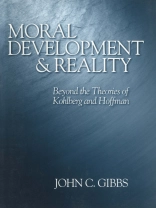’It can be confidently ventured that the present work by John Gibbs will be one of the most widely discussed contributions to moral psychology in quite some time . . . The text is quite alive intellectually, a real page-turner for those who are animated by cutting-edge debates in the moral domain. This is a work of accomplished and assured scholarship. It offers the best analysis of the contribution of Kohlberg and Hoffman to moral development theory currently available.’ - JOURNAL OF MORAL EDUCATION, Feb 13, 2004
’It can be confidently ventured that the present work by John Gibbs will be one of the most widely discussed contributions to moral psychology in quite some time . . . The text is quite alive intellectually, a real page-turner for those who are animated by cutting-edge debates in the moral domain. This is a work of accomplished and assured scholarship. It offers the best analysis of the contribution of Kohlberg and Hoffman to moral development theory currently available.’— FROM THE FOREWORD by Daniel K. Lapsley,
Chair, Educational Psychology
Department, Ball State University
’There is no one with a better understanding of how to help young people behave in a moral manner than John Gibbs. His EQUIP program, discussed in this book, is among the finest peer treatment programs available for antisocial youth. This book offers a far-reaching analysis of basic processes in moral development, and it should be read by anyone who is interested in the theory and practice of promoting positive behavior in even the most troubled young.’
–William Damon,
Director, Stanford Center on Adolescence, Stanford University
’Moral Development and Reality provides a most engaging journey through the terrain of moral and empathic development through the eyes of a seasoned guide. Gibbs′s extension and integration of his previous work offers a remarkably fresh, interesting, and provocative study, challenging traditional understandings of moral development.’
-JOURNAL OF MORAL EDUCATION
Moral Development and Reality: Beyond the Theories of Kohlberg and Hoffman explores the nature of moral development, social behavior, and human interconnectedness. By comparing, contrasting, and going beyond the works of pre-eminent theorists Lawrence Kohlberg and Martin Hoffman, author John C. Gibbs addresses fundamental questions: What is morality? Can we speak validly of moral development? Is the moral motivation of behavior primarily a matter of justice or of empathy? Does moral development, including moments of moral inspiration, reflect a deeper reality?
Useful for promoting classroom debate and academic dialogue, this innovative book examines
- Fundamental themes of Kohlberg′s cognitive developmental approach
- The recent integration of Hoffman′s theory and research on empathy and moral development
- Moral self-relevance and other variables that account for prosocial behavior
- The understanding and treatment of antisocial behavior
- Issues of moral motivation, perception, and reality
Moral Development and Reality elucidates the full range of moral development from superficial perception to a deeper understanding and feeling through social perspective-taking. Providing case studies and chapter questions, Gibbs creates a unique framework for understanding Kohlberg′s and Hoffman′s influential contributions.
Primarily intended for advanced undergraduate and graduate students in the social and behavioral sciences, counseling, and education,
Moral Development and Reality will also appeal to scholars in these disciplines.
Innehållsförteckning
Foreword – Daniel K. Lapsley
Preface
1. Introduction
Social Perspective-Taking and the Moral Point of View
The Right and the Good: The Moral Domain
Introducing Chapters Two Through Nine
2. ’The Right’ and Moral Development: Fundamental Themes of Kohlberg′s Cognitive Developmental Approach
Early-Childhood Superficiality
Beyond Centrations and Superficial Judgment
Stages of Moral Reciprocity
Assessing Stages of Immature and Mature Moral Judgment
Concluding Comment
3. Kohlberg′s Theory: A Critique and New View
Background
Kohlberg′s Overhaul of Piaget′s Phases
Adult Moral Development in Kohlberg′s Theory
A New View of Lifespan Moral Judgment Development
Conclusion
4. ’The Good’ and Moral Development: Hoffman′s Theory
The Empathic Predisposition
Modes of Empathic Arousal
Empathy and Cognitive Development: Stages of Empathic Distress
The Empathic Predisposition, Cognition, and Affective Primacy
The Empathic Predisposition, Socialization, and Moral Internalization
Conclusion and Critique
5. Moral Development, Moral Sef-Relevance, and Prosocial Behavior
Prosocial Behavior: A Rescue
Individual Differences in Prosocial Behavior
Conclusion: Two Spurious ’Moral Exemplars’
6. Understanding Antisocial Behavior
Limitations of Antisocial Youth
A Case Study
7. Treating Antisocial Behavior
The Mutual Help Approach
The Psychoeducational or Skills Training Approach
Evaluation of the Equip Program
Perspective-Taking for Severe Offenders
8. Beyond the Theories: A Deeper Reality?
Two Case Studies
A Deeper Reality?
Moral Insight and Inspiration
Conclusion
9. Conclusion
The Issue of Moral Motivation
Moral Perception and Reality
References
Index
Appendix
About the Author
Om författaren
John C. Gibbs (Ph.D., Harvard University, 1972) is Professor of Developmental Psychology at The Ohio State University. Before moving to Ohio State, he worked with Lawrence Kohlberg from 1975 to 1979 as a research faculty member at the Harvard Graduate School of Education in the completion of Kohlberg′s longitudinal moral judgment project. Dr. Gibbs′ work on moral judgment assessment and on interventions with antisocial youth not only has seen widespread use in the United States but has also been translated and adapted for use in Germany, Italy, Taiwan, The Netherlands, and other countries. His EQUIP intervention program won the 1998 Reclaiming Children and Youth Spotlight on Excellence Award. He has served as a member of the Ohio Governor′s Council on Juvenile Justice as well as the Social Cognitive Training Study Group of the Centers for Disease Control and Prevention (Division of Violence Prevention). His previous books include Moral Maturity: Measuring the Development of Sociomoral Reflection (with Dick Fuller and Karen Basinger) and The EQUIP Program: Teaching Youth to Think and Act Responsibly Through a Peer-Helping Approach (with Arnold Goldstein and Granville Bud Potter). In addition to his books, Dr. Gibbs has authored or coauthored over 60 book chapters and articles pertaining to the topics involved in Moral Development and Reality.












